- Home
- Taylor Caldwell
Balance Wheel Page 7
Balance Wheel Read online
Page 7
“You wish I didn’t think so much about Mother.”
“Well, yes. Yes, that’s it. You were so young when she died, son. I had hoped it didn’t—hurt—you so much. But I can see now that it did. I haven’t been very bright, Jimmy.”
Jimmy stood up. He came quickly to his father and put his arm over Charles’ shoulders. “Dad,” he began, then stopped.
Charles sat very still, so that Jimmy would not remove his arm. “In the end, anyway, when you’ve become what you want to become, you’ll marry Gerry, and there’ll be Wittmanns, for me, for the company, too,” he said.
Children. One day they were with you, dependent upon you, loving you. And then the next day they were men and women, and they were gone, and there was nothing left. The house was silent around you, and there were no voices, and you were alone. Next year Jimmy would be in Harvard, and there would be no one here again, not ever. Jimmy would come home for the holidays, but the air of departure would be upon him, as it was on him now. Each year he would go a little farther, and finally, he would not come back. It would be a man who would visit his father, and the boy would only be a memory. Like Mary. Loneliness filled Charles. All his grief came back to him, undiminished. If Mary had lived, there would be a little girl in this house, and Mary, too, and perhaps even a third child. Jimmy’s arm was still on his father’s shoulder, but now it had no power to lift the sadness from Charles, or drive away the loneliness.
Jimmy removed his arm. Like Charles, he was very intuitive. He felt what Charles was thinking. “I’m sorry, Dad,” he said, brokenly.
Charles aroused himself. “Don’t be, son. I’m not. I’m glad. I’m glad,” he repeated, with emphasis, seeing the indecision and the sorrow in the boy’s face. “Besides, I wasn’t thinking of the company.”
“I know,” said Jimmy, in a low voice. “I know what you are thinking, Dad.”
Charles stood up. “I know you do. Well. We’ll make all arrangements soon, won’t we? In the meantime, Jimmy, I’m hungry. And I hope the beer’s good and cold.”
He put his hand on his son’s shoulder. Jimmy was much taller than he. He kept his hand on Jimmy’s shoulder as they went together out of the room. He had never felt so tired as this in all his life.
CHAPTER VI
Charles hardly slept that night, and so the tiredness was still with him in the morning. His impulse, when getting up, was to eat his breakfast as soon as possible and leave the house before Jimmy came downstairs. But then he knew that Jimmy would be disturbed over this departure from the usual, and. would remember the conversation of the night before with wretchedness. So Charles waited for his son, and for Jimmy’s tutor, and no mention was made of the subject except when Charles was leaving. He stood up, under Jimmy’s anxious, scrutiny, and said with as much cheer as possible: “I must be going now. And, Jimmy, I’ll write that letter to Harvard today.”
Some of the weariness left him when he saw Jimmy’s bright smile. Jimmy accompanied him to the door. “You don’t mind, Dad, do you?” he asked. “I couldn’t stand it if you did. I’d forget the whole thing.”
“Nonsense,” replied Charles. He tucked his morning paper briskly under his arm. He put his hand briefly on Jimmy’s arm. “I thought it was all understood. Now, go back and finish your breakfast. But just remember, I’m proud of you. I always was, you know.”
He had the new automobile brought for him, for he had some distance to go to see the farmer who owned the Burnsley land. He had work to do, and so he put aside his personal matters for the time. He thought about the option he would obtain on the Burnsley property, and the meeting on Thursday. Again, remembering Jochen, he smiled a little. He opened his paper and glanced through it. Then he frowned. So, Wilson was confident that the Underwood Tariff Bill would become law this fall, was he? Wilson was probably right. No wonder the country was showing all the signs of an approaching major depression. The new tariff law would reduce percentage of tariff rates from 37% to 27%. Business men expressed their gloom. It was all very well to stimulate European industry, but a man had to think of America, too. The cotton mills, for instance, anticipating a reduction in tariff rates of at least one-third, were already laying off men. Raw wool imports would be on the “free” list, and there would be a reduction of almost two-thirds in the tariff on woolen clothing. More Americans unemployed. Idealism was good, provided the country did not suffer. But once let the idealists run wild and America was in danger.
Charles was not a “party” man, though he was a registered Republican. He voted as he pleased, provided the candidate had “sound” principles. He had no doubt of the integrity of Mr. Wilson. But Mr. Wilson was an idealist, and Charles did not particularly care for idealists, who knew little or nothing about business and reality and human nature. And there was that William Jennings Bryan, now Secretary of State. Another one whose contact with the world was almost nonexistent. He was a “peaceful” man, and he had a, deep belief in all the Articles of the Hague Convention. Of course, there would never be any major wars again; that was understood. It was only common sense. But still, Mr. Bryan’s vociferous reiteration of this made Charles dimly uneasy. Mr. Bryan had announced his plan for a joint commission from every nation to decide upon any quarrel between governments which ordinary diplomatic methods had failed to settle. All very well. But why was Mr. Bryan urging his plan upon the President, as if any such a quarrel had any possible chance of arising?
The heat of the last few days had abated. A sweet fresh wind blew across the fields as Charles’ automobile was driven carefully along the newly paved road. Everything shimmered in vivid brightness. The trees moved in a thousand shades of green against the brilliant sky. Cattle stood in their shadows. Distant wheat glittered in tall gold. The automobile rolled past farmhouses deep in flowers and shrubbery. Here and there a man worked in the fields; a dog or two barked wildly after the automobile, which raised yellow dust in the sunlight, and considerable noise.
War. War, with whom? Why these ominous whispers behind the words of public men? Perhaps he, Charles, was too depressed this morning. Hadn’t the Anglo-American Treaty of 1908 been dropped by the Senate only last May? Was that good, or bad? Why had Mr. Bryan renewed it, in collaboration with Sir Cecil Spring-Rice? Did they know something no one else seemed to know? There was this trouble with Mexico. But a minor trouble. No one took it very seriously. What had the Anglo-American Treaty to do with this?
It seemed to Charles, suddenly, that when public men talked loudly of peace and neutrality it was time for a people to become very suspicious and careful. Then he shrugged. His mind was muddled this morning. Anglo-American Treaties—and Mexico. They were entirely unrelated. He, Charles, was no politician, but even he could see this. He settled down on the leather seat, though all at once he was not comfortable. Suddenly the passing countryside no longer seemed luminous and beautiful to Charles.
Charles had no objection to the English. The German Empire: Well, the Kaiser was a man of common sense, even though he was ambitious. I’m ambitious myself, thought Charles. But still, there was a point where ambition became madness, an obsession.
And now all this emphasis upon peace. No one had talked of “peace” since the short Spanish-American War. Peace was taken for granted. No one talked very much about sunshine, or air. It was part of living, just as peace was now part of living. Charles looked through the paper again. Here and there, under his sharpened eye, he saw firm beliefs in peace expressed by the British Government, the American Government, the German Government, and even the Balkan Governments. Was it only his imagination, but did all this talk really sound sinister? Was there a hidden disease stirring in the world, this shining August day in 1913?
Charles threw aside his paper, calling himself several uncomplimentary names. And then, without warning, he thought of Jimmy again. But it was not of Jimmy’s desire to be a physician of which he thought. “Nonsense,” said Charles, aloud. Fortunately, his coachman, now acting as driver of the automobile, did not hear
this exclamation. Charles felt foolish. He threw the paper over to the side of the seat, and began to smoke. He concentrated upon the Burnsley matter, and Thursday.
He had no difficulty in obtaining an option for three months. That business concluded, he was driven back to the city, his own city of Andersburg, brawny and busy and full of sturdiness. Of course, unemployment was rising here, as it was rising all over America. But probably it was just a passing flurry, occasioned by the proposed new tariff. The country would adjust itself. America had an immense capacity for adjustment. And though there were many fools who said that all that could be invented had already been invented, these past thirty years, and that everything else would only be “improvements” on existing inventions, Charles was convinced that America was only entering upon an age of invention and that the industrial revolution had only begun to make itself felt. That is why he had privately bought, with his own money and not in the name of the company, a patent for a certain aeroplane steering-control assembly. He had paid only two thousand dollars for the patent. The man who had invented this assembly was now dead.
Charles looked at the innocent blue above him. Only a bird wheeled here and there. Occasionally, but very occasionally, the people were excited by a sudden roaring and a glimpse of some aeroplane from Pittsburgh, a fragile thing out on a “test.” Last Fourth of July five aeroplanes had been persuaded to add to the city’s festivities by diving and dipping and rising over a somewhat squalid “park” in the suburbs. Charles remembered the inventor whose patent he had bought. The man had assured him it was better than any assembly the Curtiss people made and owned. It had been designed for greater and heavier aeroplanes than the Curtiss factories were making, or contemplating making. So the Curtiss people had not been interested. But Charles had been interested. The inventor had shown him rather wild designs for the “aeroplane of the future.” Charles had not laughed. He had only bought the patent, two years ago.
There were times when he smiled at himself a little because of that purchase. But still, so many things could happen. Charles believed in the future, especially the future of America. It was his private opinion that in spite of the might and size of the British Empire, and the growing power of the German Empire, true Empire was moving inexorably to the Americas. The inventor might have been a little mad, but he had said to Charles, his eyes glowing: “The sun is rising west.”
He lit a cigar Jochen had pressed on him the night before. No one ever smoked cigars like Jochen’s. Rich Havanas, with light sweet aroma. He, Charles, would never buy such expensive cigars, but he enjoyed his brother’s, and once or twice, when not invited, he had filched some from Jochen’s humidor. Old Joe. Charles forgot all about the newspapers and the aeroplane, and contemplated Jochen’s coming consternation with deep pleasure.
The automobile was approaching the Wittmann Machine Tool Company. Charles, over Jochen’s protests and ridicule, had landscaped and improved the ground which surrounded the factory. It might be in a neighborhood long abandoned to poor homes and even to slums, but Charles would have his way, and with the company money, too, Jochen had said bitterly. The factory had grown from a small red-brick building, built by Charles’ grandfather, and two larger buildings had been added to it by Emil Wittmann. Twelve years ago they had been joined by another building, twice as large as any of the others. Charles had actually called in an architect from Pittsburgh for this work, who had worked with the enthusiastic Wilhelm. The three smaller factories had been thrown together; behind them rose the four-story new building, in perfect proportions. This had not been enough for Charles; he had enlarged the small windows on the older buildings to match the large windows in the new building. All gimcracks had been removed. There was a clean starkness in the beginning, but now evergreen ivy rippled over the entire factory, which had become one unit. Lawns had been planted, and shade trees, now large and thick and green. Charles had added flower beds, the final disgusting note, according to Jochen.
Then Charles had gone to work on the immediate houses about the factory, which housed most of his workers. He had prevailed upon the men to plant lawns, small trees and shrubs and flowers, to paint their homes and to improve them. When monetary assistance was needed, he gave it. He could do nothing about the houses and the slums beyond this area, but at least, when the looked through his office windows, he had a pleasant immediate view. His men, startled at first, and suspicious, had finally become excited when one by one Charles had bought the small houses from grudging landlords, and had suggested to the men that they buy them from him in return. He gave them long mortgages, at a low interest rate, and quite often without down payments. He had been younger then, and he had thought that Friederich would approve. But Friederich had said, with Jochen’s own avaricious bitterness: “Paternalism!” Friederich, Charles had said, was a trifle inconsistent considering he had no objection to State paternalism.
“How about giving the men the houses then, instead of selling them?” Charles had asked his brother, jokingly. He had not been too startled when Friederich had stared at him with surprised sullenness, and had then walked away in silence. Friederich never spoke about the matter again.
The offices were in the largest, last building. There was a general waiting room, a big office filled with clerks and bookkeepers and stenographers, and then the four offices of the brothers, and a directors’ room beyond them. Wilhelm came to the offices once a week, where, as treasurer, he signed the pay-roll. Friederich made his appearances less often; he had a head clerk who did almost all his work as secretary. Only Charles and Jochen worked every day. They had the largest offices. Charles’ office was the first, beyond the waiting room, a pleasant place with two big windows, a dark-red carpet, a fireplace, a big oak desk, a red-leather sofa, and some good strong chairs.
He stopped at the small office near his where his chief clerk worked industriously. “Hello, Parker,” he said. “Anything new this morning?”
Jack Parker rose quickly. He was a thin man, worn but amiable, about fifty years old. “Some telephone calls, sir,” he replied. Then he hesitated. “Mrs. Wilhelm Wittmann is in your office, Mr. Wittmann.”
Charles took the cigar out of his mouth. Phyllis. “Good,” he answered, vaguely. He walked away. Wilhelm was here, of course, to sign the pay-roll checks. Phyllis often called for him in their carriage, either to take him home or to luncheon at the home of a friend. It was nothing new. But she always waited in Wilhelm’s office.
Charles found her sitting in one of his comfortable chairs. She smiled at him gayly when he appeared. “Good morning, Charles,” she said, in her pretty voice. Her blue eyes sparkled at him, as if with amusement.
“Why, good morning, Phyllis,” he answered. He sat down behind his desk. There was a little pile of notes on its wide neatness. He looked at Phyllis, hiding his wonder. But he smiled. “Wilhelm chase you out of his office?”
“No,” she answered. Her sparkle was suddenly gone, though her smile remained. She was dressed in a blue linen suit, which matched her eyes. The jacket fell open to reveal a soft white blouse, which was not boned to the jawline, but which revealed her white throat and the glistening pearls around it. She wore a wide straw hat, heaped with blue and pink roses, and there were white kid gloves on her hands, and white slippers on her feet just below the hem of her skirt. A big book lay upon her knees, and she had crossed her hands over it
Yes, thought Charles, Phyllis was much thinner, and her beautiful face had a tired look in spite of the smile. But the thing that interested him was her air of quiet alertness. It might have been his imagination, but he thought there was a tense expression about her mouth.
“How are you, Charles?” she asked. Her voice was lower than usual.
“Me?” he asked, a little startled. “Well, I suppose. As well as yesterday.”
Phyllis studied him with gentle candor. Her bronze brows, the color of her hair, momentarily drew together. She did not look away from him. Her voice dropped even lower. “Wilhelm an
d I are having luncheon with the Bachs today. I just called for him. He should be finished, soon.” She paused. “When I came in, Mr. Parker told me that Jochen was with Wilhelm. The door was shut.”
She waited. Charles lifted the notes in his hands, but he did not look at them. Instead, he looked at Phyllis. He did not speak.
“I could have gone in, of course,” she continued. “But I thought it might be a business conference of some kind. Mr. Parker said Jochen had been with Wilhelm for nearly an hour. Naturally,” she said, and now her face was grave, “I could have waited for Wilhelm in the waiting room. Instead, I told Mr. Parker I would wait in here, and that he was to inform Wilhelm where I was. So,” she said, very softly, “Wilhelm would have to come in here for me, when he had done his work.”
Charles put down the notes. He pushed them aside. “Thanks, Phyllis,” he said. He leaned back in his chair, frowning.
But she was smiling again, her eyes narrowed and tilted. “You don’t mind, do you, Charles?”
He picked up a pencil and turned it over and over in his fingers. “Thanks, Phyllis,” he said again.
It was nothing, of course. But his instinct was stirring.
“How are you, Phyllis?” he asked, when he became aware that she was watching him too intensely.
“I’m splendid, thank you,” she answered.
They could hear the muffled pounding of machinery. The open windows let in a warm puff of wind. A big wagon rolled under the windows, grinding on the gravel. There was a hushed tapping of typewriters in the office across the hall. A train whistled in the distance, at the foot of the mountains which overlooked Andersburg.
“I thought you seemed tired yesterday,” murmured Charles.
“You seem tired yourself,” she replied.
Charles hesitated. He said: “Jimmy told me last night that he wanted to be a doctor. He’s going to Harvard.”

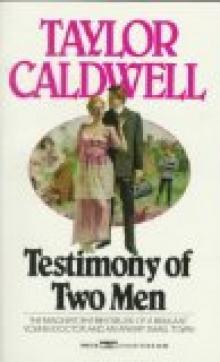 Testimony of Two Men
Testimony of Two Men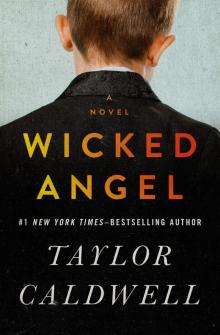 Wicked Angel
Wicked Angel The Arm and the Darkness
The Arm and the Darkness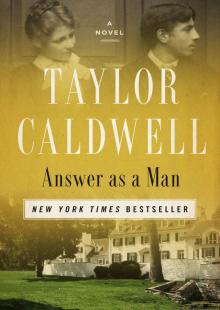 Answer as a Man
Answer as a Man Grandmother and the Priests
Grandmother and the Priests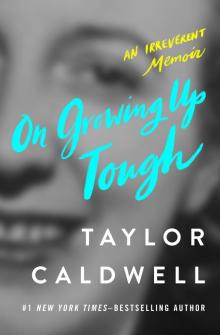 On Growing Up Tough: An Irreverent Memoir
On Growing Up Tough: An Irreverent Memoir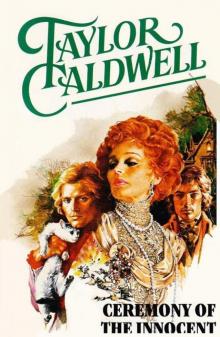 Ceremony of the Innocent
Ceremony of the Innocent The Listener
The Listener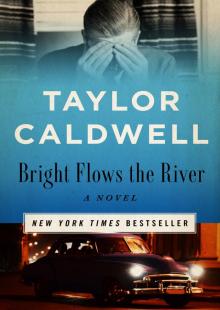 Bright Flows the River
Bright Flows the River The Earth Is the Lord's
The Earth Is the Lord's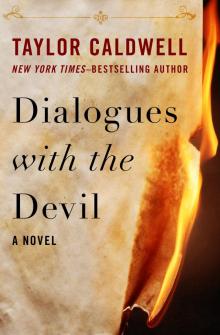 Dialogues With the Devil
Dialogues With the Devil A Tender Victory
A Tender Victory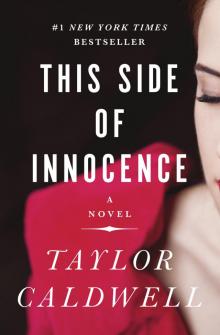 This Side of Innocence
This Side of Innocence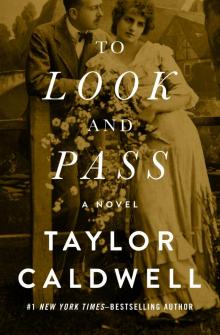 To Look and Pass
To Look and Pass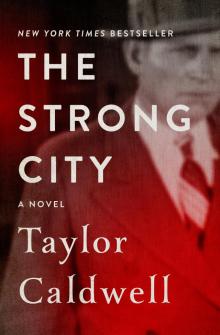 The Strong City
The Strong City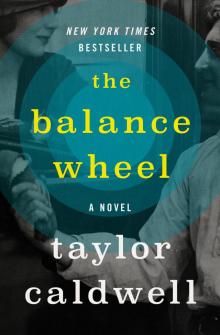 Balance Wheel
Balance Wheel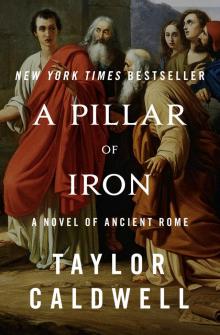 A Pillar of Iron: A Novel of Ancient Rome
A Pillar of Iron: A Novel of Ancient Rome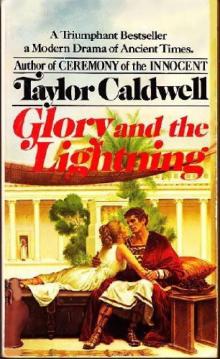 Glory and the Lightning
Glory and the Lightning Dear and Glorious Physician
Dear and Glorious Physician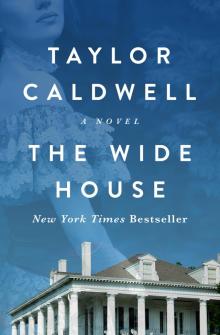 The Wide House
The Wide House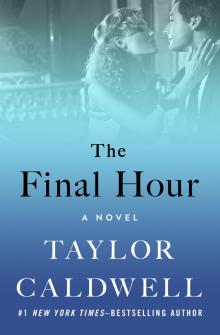 The Final Hour
The Final Hour Never Victorious, Never Defeated
Never Victorious, Never Defeated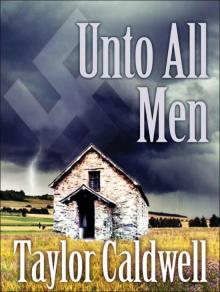 Unto All Men
Unto All Men The Turnbulls
The Turnbulls Your Sins and Mine: The Terrifying Fable of a World Without Faith
Your Sins and Mine: The Terrifying Fable of a World Without Faith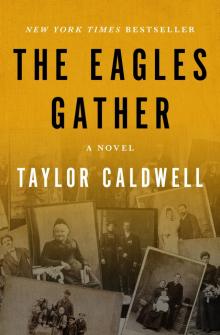 The Eagles Gather
The Eagles Gather Let Love Come Last
Let Love Come Last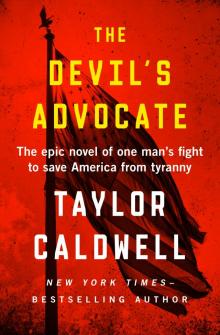 The Devil's Advocate: The Epic Novel of One Man's Fight to Save America From Tyranny
The Devil's Advocate: The Epic Novel of One Man's Fight to Save America From Tyranny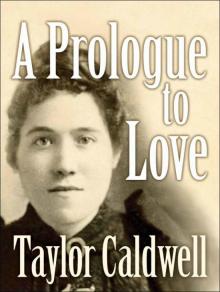 A Prologue to Love
A Prologue to Love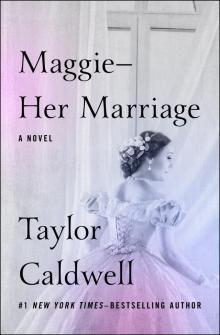 Maggie: Her Marriage
Maggie: Her Marriage The Late Clara Beame
The Late Clara Beame Melissa
Melissa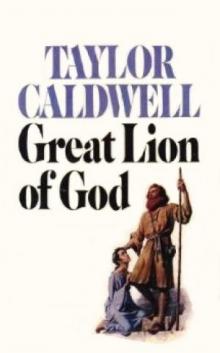 Great Lion of God
Great Lion of God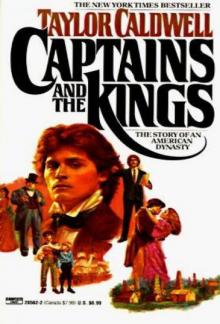 Captains and the Kings
Captains and the Kings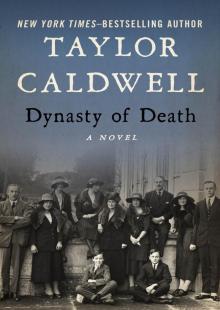 Dynasty of Death
Dynasty of Death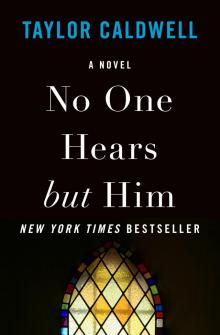 No One Hears but Him
No One Hears but Him The Sound of Thunder
The Sound of Thunder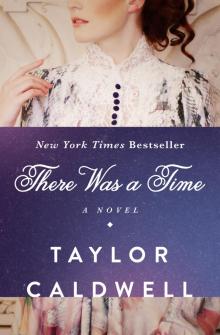 There Was a Time
There Was a Time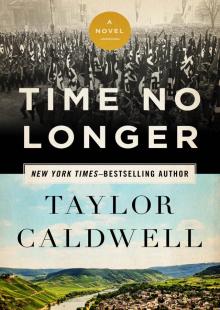 Time No Longer
Time No Longer I, Judas
I, Judas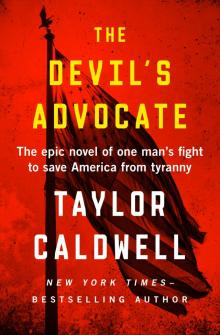 The Devil's Advocate
The Devil's Advocate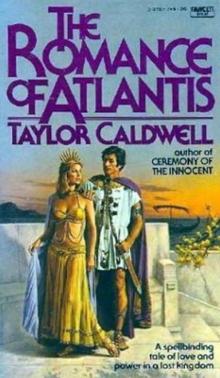 The Romance of Atlantis
The Romance of Atlantis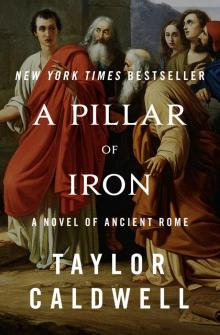 A Pillar of Iron
A Pillar of Iron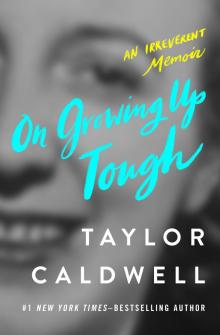 On Growing Up Tough
On Growing Up Tough Your Sins and Mine
Your Sins and Mine